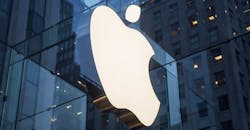Apple Expects to Pay $38 Billion Tax on Repatriated Cash
Apple Inc. said it will bring hundreds of billions of overseas dollars back to the U.S., pay about $38 billion in taxes on the money and invest tens of billions on domestic jobs, manufacturing and data centers in the coming years.
The iPhone maker plans capital expenditures of $30 billion in the U.S. over five years and will create 20,000 new jobs at existing sites and a new campus it intends to open, the Cupertino, Calif.-based company said Wednesday in a statement. Apple’s shares gained less than 1% to $177.27 at 1:26 p.m. in New York.
“We are focusing our investments in areas where we can have a direct impact on job creation and job preparedness,” CEO Tim Cook said in the statement, which alluded to unspecified plans by the company to accelerate education programs.
In its December approval of the most extensive tax-code revisions since 1986, Congress scrapped the previous international tax system for corporations -- an unusual arrangement that allowed companies to defer U.S. income taxes on foreign earnings until they returned the income to the U.S. That “deferral” provision led companies to stockpile an estimated $3.1 trillion offshore.
By switching to a new system that’s designed to focus on domestic economic activity, congressional tax writers also imposed a two-tiered levy on that accumulated foreign income: Cash will be taxed at 15.5%, less liquid assets at 8 percent. Companies can pay over eight years.
Apple has the largest offshore cash reserves of any U.S. company, with about $252 billion in at the end of September, the most recently reported fiscal quarter.
The company, which opened a new headquarters in Cupertino last year, said it also plans to open another site in the U.S. focused initially on employees who provide technical support to Apple product users. Apple said it will announce the location of the new campus at a later date. The company already has a sprawling campus in Austin, Texas, for supply chain and technical support employees.
“These are probably many capital expenditure initiatives and new site build-outs that Apple was already planning on doing regardless of repatriation,” said Michael Olson, an analyst at Piper Jaffray, who has the equivalent of a buy rating on the stock. “What’s not said in this release is that there is more potential for increased buybacks for shareholders and acquisitions that might not have taken place if it were not for the cash influx from overseas.”
By Alex Webb
About the Author
Bloomberg
Licensed content from Bloomberg, copyright 2016.
